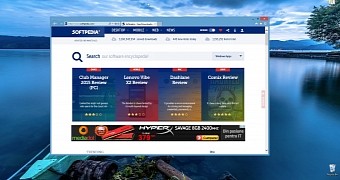Microsoft is working on a completely new browser for Windows 10, which could at first be offered alongside Internet Explorer, but details have been very limited until now, despite the fact that Redmond is reportedly planning to disclose more information at the upcoming event on January 21.
A report published by The Verge provides us with a little bit more details about Spartan, all unconfirmed, but which still make sense, given the fact that Microsoft is hard at work to make Windows 10 successful.
Spartan adopters with a touch screen or a 2-in-1 PC will be able to use a stylus to annotate a web page and send notes to other users, with everything to be powered by the OneDrive cloud-based storage service. Users can collaborate and work on annotations in groups, thus making collaboration one of the key features of the new browser.
Cortana will also work with Spartan
The Hallo-themed story will continue in the next version of Windows as well, with Cortana now expected to work together with Spartan to provide users with quick tasks that can be performed via voice commands.
Users will be able to search the web with Cortana and even perform some quick actions, such as tracking flights or getting information for hotel bookings.
Basically, Cortana will become the core of all search features in Spartan, so the existing functionality backed by Bing in Internet Explorer will go in a completely new direction in Windows 10.
Advanced tab support
As compared to Internet Explorer, Spartan is going to be much more focused on popular features such as tab support, so the browser will come with several new features in this regard.
Users will be able to group tabs in categories, which obviously comes in handy when trying to separate work from personal pages. Interestingly, the report claims that Microsoft was also planning to introduce themes in this browser, but development of this version has been stopped for the moment.
Lastly, Spartan is going to be available through all platforms that Microsoft currently supports, including tablets, smartphones, and PCs. Spartan is very likely to be offered as a Store app, which means that users should be able to get it easily just like any other Metro app, while Microsoft can easily deliver updates on a regular basis.
As you could see in the blurry screenshots leaked yesterday, Spartan is going to look very similar to Google Chrome, with a much simpler look which, according to the report, “is designed to be lightweight,” without any old element that was previously available in Internet Explorer.
As far as the name is concerned, Spartan is currently a codename, so it’s not yet clear whether the same name will be used for the final product or not.

 14 DAY TRIAL //
14 DAY TRIAL //